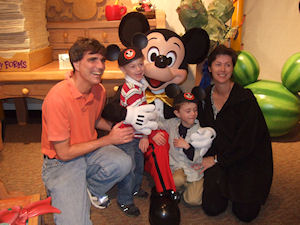In The Last Lecture Randy Pausch tells a story from his childhood.

He was strolling around Disney World when he bought a small salt and pepper shaker as a gift for his parents. When out of the shop, it slipped out of his hands and broke. He burst into tears. The employees did the unexpected: they told that it was their own fault, because the gift was badly wrapped, and gave him a new one. Randy reminded that moment with this words:
I was in shock. Not just gratitude, but disbelief. My sister and I left the store completely giddy.
Watching at the scene with the eye of the magician, I have always been fascinated by the choice of these words. Like a spectator experiencing a good magic trick, Randy is “shocked in disbelief” and “giddy” for what is happening – but with an additional ingredient: a deeper gratitude than the one usually credited to a good magician. I started to think that those employees had performed some real magic. Out of a theatrical context. No need of gaffed cards, smoke and mirrors. If it’s true that only the “effect” matters, they have been authentic – although unaware – magicians.
I noticed that there was a magic ingredient behind it, never documented in any book about magic tricks: in a society dominated by indifference and the cult of money, focusing on the individual may provoke disbelief and giddiness. Ferdinando Buscema had coined a perfect term to describe a type of magic within reach for everyone: magic experience design. He was the perfect mate with whom to arrange a systematic collection of stories like this.
The result? One of the most unusual books about magic ever conceived: a practical manual to become magicians in everyday life, without the need of playing cards, hypnotic fascination and circular saws. A collection of ingredients you will never find in books about magic tricks: stratagems and techniques that expand the definition of “magic” we are accustomed to and will accomplish its most precious vocation: that of “hacking reality” – and therefore to change the world.
BY-NC-SA 4.0 • Attribution-NonCommercial-ShareAlike 4.0 International